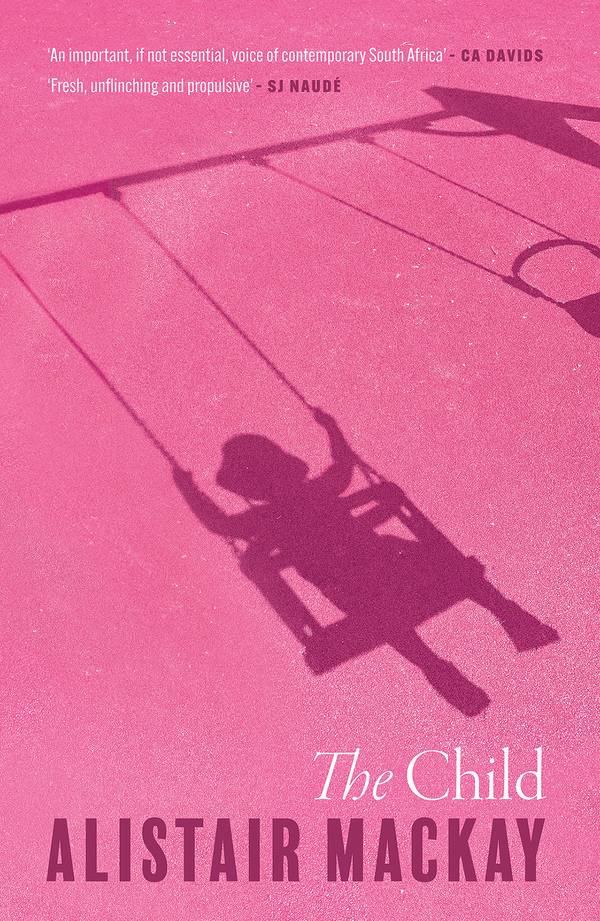Birth of the new: Alistair Mackay’s (above) latest novel involves a man returning to Cape Town with his husband after a stint in New York, wanting to adopt a child. Photo: Brenda Veldtman
Cape Town looks dry from the plane. I try to point this out to Adrian beside me but I’m conscious of speaking very slowly and slurring my words. I’m heavily sedated, with beta blockers and sleeping pills and booze. Some homeopathic calming chews as well. I take combinations that are not recommended, in doses that are not recommended.
A delicate balance: not so much that I’ll kill myself, but enough to keep the plane whole, to stop the engines from exploding and engulfing us all in flames as we plummet to the earth. Enough to unclench my jaw, to keep my teeth from shattering in my mouth.
“It looks like the Middle East,” I say, avoiding the term “aerial footage” which comes to mind but would prove difficult for my tongue in this woozy fog.
“You’ve never been away,” Adrian says and smiles at me.
I wave away his doubt. Things are worse than I realised. The vegetation is dead. The mountains are brown. The sky a terrible greyish white, like sun-bleached bones.
There are notices all over the airport about the drought. A countdown clock measures the days until the city runs out of water. The taps have already been switched off in the airport public toilets. Little blue bottles of waterless hand sanitiser wait by the basins.
I read apocalyptic predictions in our Uber on our way into the city. CNN, BBC, The Guardian, The New York Times. We’re all over the global press. Mixed in with the dread, and the exhaustion that follows the adrenaline when we touch down on solid ground, a strange sense of accomplishment: The world is paying attention to our crisis.
Our ignored continent, where no one cares what happens, where tragedy is supposed to be part of the brand. This time, we’re a canary in the coal mine. This climate chaos is coming for you, so this African suffering matters.
“It’s a strange time to move home,” the Uber driver says to me. “Cape Town’s in trouble.”
He’s Zimbabwean, I’d guess, from his accent and the music playing on his sound system.
“How’s it been?” I say.
“You will see, you get used to it. The politicians say they will send in the army when they switch off the taps.”
Shacks glide past my window. Slums stretch to the distant mountains. Sheet metal, canvas, cinder block, wooden crating — homes built from anything that can be found. Packed close together, holding one another up. Emaciated goats search in vain for grass along the fence that keeps these settlements from spilling over onto the verge, where children play soccer in the sand. We pass beneath a pedestrian bridge encased in steel mesh, like a long metal cage. It used to be a problem, I remember. People on bridges throwing bricks onto the freeway below, shattering the windshields of cars racing to the airport. All those passengers bound for Europe and America and Asia, for gap years and ski holidays and shareholder meetings. Honeymoons and cheeky little getaways […].
“Why did you come home?” the driver says.

It sounds like a real question, warm and interested, not an accusation of madness — how could anyone choose this? They are usually white, the people who inflect it like that, and I tell myself they are usually older than me, too. Some people assume that our moving home means we failed to make it in the world because they think the world is other places. But then there are those who ask the question out of nervous optimism. They want to believe South Africa is going to be okay, and they want to believe that my moving home means I do, too.
“He wants to have a child,” Adrian says from behind me.
I catch his eye in the rear-view mirror and hold his gaze for what feels like minutes. […] Does he hold it against me that our time in New York was cut short, or is he trying to protect me?
The driver glances between Adrian and me, aware that something is going unsaid. “Hey, you guys are funny,” he says. “Normally the white people who talk about kids are the ones who want to leave.”
I laugh and shake my head in a way that I hope conveys we’re not those kinds of white people.
“That’s amazing, man,” the driver says, genuinely delighted. “Congratulations. So your girlfriend is pregnant?”
I try to catch Adrian’s eye again, but he’s looking out the window.
“I’m going to adopt,” I say.
Whatever the reason Adrian said “he” instead of “we”, it’s easier just to go along with it. It’s tiring to have to surprise taxi drivers with our sexuality, with our marriage. We both pass for straight most of the time, if we’re sober and in the company of anyone but our closest friends.
We both probably seem pretty straight right now. It was something I was proud of, once. To be gay and ordinary seemed revolutionary when I was younger. Proof that I wasn’t despicable and effeminate, showy or bitchy or shallow. Now, it just makes me sad that I got so good at passing. I don’t even remember what parts of myself I cauterised.
“You know, children are a lot of work,” the driver says, laughing and shaking his head. “Too much work for one person. You must meet a nice girl.”
“I know plenty of nice girls,” I say, trying to sound light-hearted and non-committal. And maybe like one of the boys.
Alistair Mackay is one of the participants in the Kingsmead Book Fair on 25 May. The Child is published by Kwela Books.